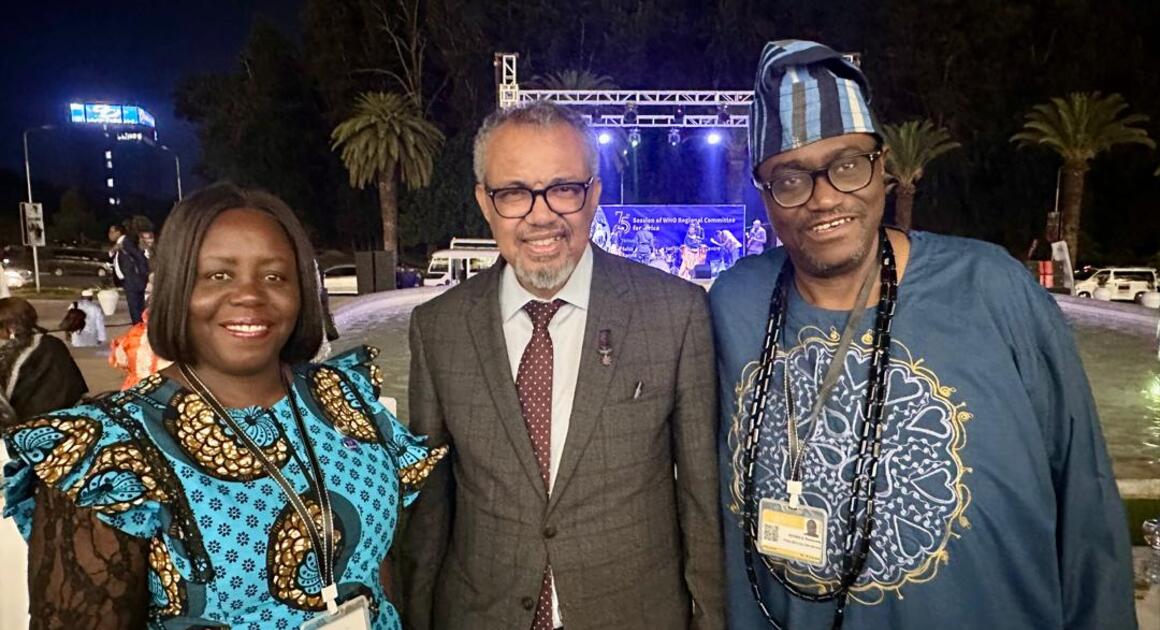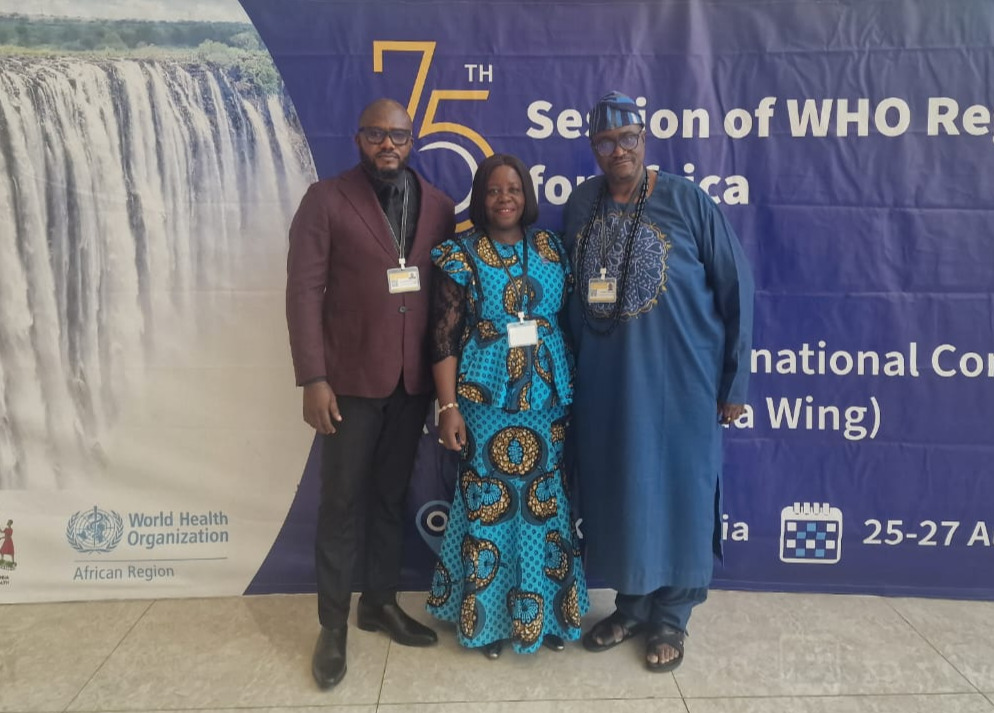in Lusaka, Zambia PSI Calls for Public Funding at the 75th WHO African Regional Committee Meeting
 Perpetual Ofori-Ampofo, President of the Ghanaian Regional Nurses and Midwives Association, WHO Director-General, Dr Tedros Ghebreyesus and PSI Health and Social Services Sector Officer Baba Aye
Perpetual Ofori-Ampofo, President of the Ghanaian Regional Nurses and Midwives Association, WHO Director-General, Dr Tedros Ghebreyesus and PSI Health and Social Services Sector Officer Baba AyeAs the trade union voice of health and care workers globally, and within the WHO, PSI urged African governments to adequately fund the education, employment, and retention of the health workforce at the meeting, advocating for public funding of Health, health workers' rights, and Investment in the wellbeing of women.

Baba Aye
Public Services International participated in the 75th session of the Regional Committee of the World Health Organization Regional Office for Africa, which took place on 25 to 27 August, in Lusaka, Zambia. The PSI delegation comprised Baba Aye, PSI Health and Social Services Sector Officer, Perpetual Ofori-Ampofo, President of the Ghanaian Regional Nurses and Midwives Association (GRNMA) and Dr Gilbert Tsolenyanu, General Secretary of the Hospital Workers Union, Togo (SYNPHOT).
This was the first Regional Committee meeting since the emergence of Professor Mohamed Yakub Janabi from Tanzania as the Regional Director of WHO AFRO earlier this year. Speaking at the opening session of the conference, the WHO Director-General, Dr Tedros Ghebreyesus, noted that Prof. Janabi was taking charge of the Regional Office at “an unprecedented and extremely tumultuous time for WHO”, marked by “a very difficult financial situation” and attendant restructuring of the organization.

This challenging situation which is part of broader global attacks on the funding of public services and democratic rights in the current period, was a shadow that followed discussions on several items of the agenda. The Regional Office’s promotion of partnership with private sector and philantrocapitalist foundations, in the director’s report reflected this. Indeed, one of the new non-state actors welcomed into official relations with the WHO Regional Committee was the Dangote Foundation, which is a major force in driving the campaign for the privatisation of healthcare delivery in Africa, cloaked as public-private partnership.
Addressing the Regional Committee, Baba Aye cautioned Member States against support for partnerships for financing which prioritise the private sector, in whatever guise.
He pointed out that; they do not help close health financing gaps for governments. The notion that private health providers can help with achieving health for all is a myth. The evidence shows that their involvement in healthcare delivery promotes health inequity. This is because their operations are based on the profit-motive, undermining a people-centred approach to “health security”. Member States should rather promote public-public partnerships and close their financing gaps by making corporations pay their fair share of taxes and stop Africa’s annual bleeding of $90 billion from illicit financial flows, for example.
Baba Aye also urged African governments to invest in social care, decent work for community health workers and addressing the socio-economic determinants of health, such as safe housing, and secure employment.
As the global voice of the organised working class in the health and care sector, PSI urged African governments to adequately fund the education, employment and retention of the health workforce, at the meeting. Dr Tsolenyanu pointed out that it is impossible to achieve universal health coverage on the continent with its current shortage of over six million health workers, which is significantly higher than any other region in the world. Health worker migration worsens the situation. This is driven by poor pay and abysmal working conditions in African countries. He thus urged Member States of WHO AFRO to ensure adequate improvement in the salaries and working conditions of health workers, in line with the Decent Work Agenda.
Dr Tsolenyanu also called on governments across Africa to respect the fundamental principles and rights at work as enshrined by the International Labour Organization, in the health sector. Violation of workers’ rights, he underscored, sparks labour conflict. In addition, he advised the WHO Regional Office and the health bodies of regional blocs on the continent to establish working relations with sub-regional networks of health workers and the African Health Sector Unions’ Council (AHSUC).
The agenda item on the health and wellbeing of women, children and adolescents was one of key concern to PSI, as part of our commitment to gender equity and the social reorganisation of care. Thus, Perpetual Ofori-Ampofo commended the modest but commendable progress made in reducing maternal and child mortality, but also noted that the situation is still very worrisome. As she pointed out; 70% of maternal deaths and 55% of under-five deaths in the world still occur in the region. And even the progress made thus far is still very uneven.
Ofori-Ampofo thus called on African governments to address the root cause of the problem. This would require adequate public funding of health, in line with the 15% budgetary provision of the Abuja Declaration. Intentional steps also have to be taken for accelerating progress in the health and well-being of women and children. Investment in education, training and decent work for health workers, she added is also fundamental, as well as the active involvement of health workers’ unions in the policy process.
The WHO AFRO Regional Committee meeting flags off the series of meetings of WHO Regional Organisations across the world, which bring together governments of countries in each of the regions of WHO. As the trade union voice of health and care workers globally, and in the WHO, PSI will participate actively in all of these meetings over the next month, speaking out for health and care workers, and calling for adequate funding of quality health care as a fundamental right that every woman, man and child must be able to enjoy.